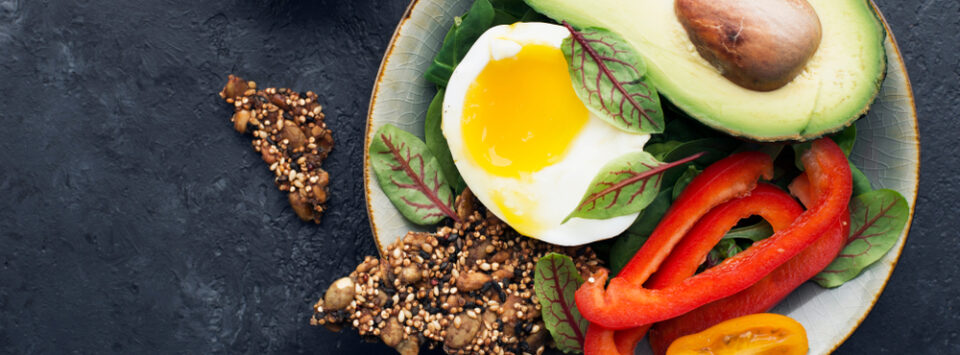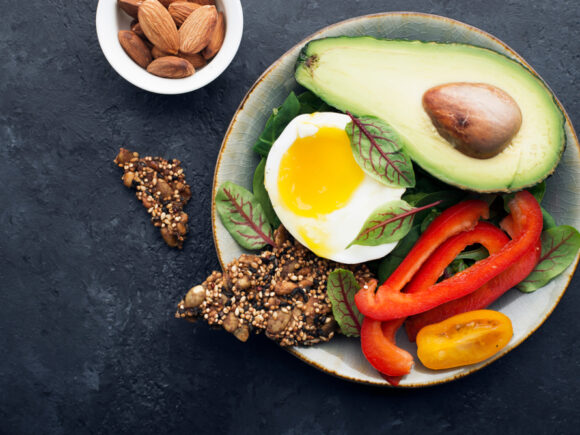9 Most Effective Keto Supplements


If you want to know more about these supplements and their benefits, then look to the list provided below for reference:
#1 – MCT Oil
Some of the most popular keto supplements available right now are Medium-chain triglycerides or MCTs. They are metabolized a bit differently than the most common type of fat found in food known as long-chain triglycerides or LCTs.
The MCTs first get broken down by your liver and then immediately enter your bloodstream, where they can be used as a source of fuel for your brain and muscles.
One of the richest and natural sources of MCTs is coconut oil, in which 60% of its fatty acids come in the form of MCTs. But extracting MCT oil from coconut oil provides an even greater concentrated dose of MCTs, which can further benefit ketogenic dieters.
When dieters use MCT oil as a supplement, it can quickly increase their healthy fat intake as well as increase their ketone levels and helps them stay in ketosis. It also aids in weight loss and boosts feelings of fullness, especially if you’re using keto diet as a means to lose some pounds.
MCT can easily be added into smoothies or shakes or can also be taken by the spoonful for a quick boost of healthy fat.
For starters, it’s always a good idea to start with a small dose (like 1 teaspoon or 5 ml) of MCT, just to see how your body reacts to it before you can even take the standard dose as recommended on the supplement bottle.
Please note, MCT oil can cause nausea and diarrhea in some people.
#2 – Exogenous Ketones
Exogenous Ketones are simply ketones, only in supplement form. They have the same molecular structure as the endogenous ketones that are naturally produced in your body through a process called ketogenesis.
These supplements can come in powder, liquid or pill form. There is also solid evidence that they actually put the body into ketosis, so they clearly aren’t a gimmick.
Here are some of the ways exogenous ketones can help keto dieters out with:
- Correct Mistakes: If for instance, you took in too many proteins or carbs, consuming exogenous ketones can help you stay in ketosis by instantly increasing your ketone levels, controlling insulin release and lowering blood glucose.
- Ease Ketosis: It usually takes at least three days for your body to go into ketosis and even longer before it adapts to the keto diet. But by taking exogenous ketones, researchers believe that they can speed up your body’s keto-adaption and smoothen the transition to natural ketosis.
- Appetite Control: Exogenous ketones are an ideal solution to get you to reduce weight. In fact, a very recent study showed that drinking these supplements after an overnight fast suppresses your appetite for at least 4 hours.
- Keto Flu: When you switch from carbs to healthy fat, keto flu is a common phenomenon your body is going to experience. Some of the most recurring symptoms during this transition include muscle cramps, headaches, fatigue, and nausea among other things. Fortunately, keto flu begins to wane as soon as your body starts making ketones and exogenous ketones can speed up this process.
- Brain Boost: Ketones are considered to be natural nootropics for your body and taking them in supplement form can have the same effect. One study even showed that taking supplements can help reduce anxiety, likely due to improving cognitive function.

#3 – Omega-3 Fatty Acids
Fish or krill oil, which is an omega-3 fatty acid supplement, is rich in omega-3 fatty acids such as docosahexaenoic acid (DHA) and eicosapentaenoic acid (EPA) that can benefit your health in a number of ways.
Both of them (DHA and EPA) are found t0 lower inflammation, prevent mental decline and reduce the risk of heart disease.
Some western diets tend to be lower in omega-3s (found in fatty fish) and higher in omega-6 fatty acids (which is found in founds such as processed foods and vegetable oils). This creates an imbalance in the body which promotes inflammation, which leads to an increase in various inflammatory diseases.
Omega-3 supplements are especially beneficial to keto dieters as it helps them maintain a healthy omega-3 to omega-6 ratio when following a high-fat diet. It gets even better as these supplements can enhance the keto diet’s impact on one’s overall health.
A study showed that ketogenic dieters who supplemented with omega-3 fatty acids from krill oil had experienced more decreases in inflammatory markers, insulin, and triglycerides than those who didn’t.
When you go out to shop for omega-3 supplements, be sure to choose from reputable brands that provide at least a combined 500mg of DHA and EPA per 1000mg serving.
People who are on blood-thinning medications should consult their doctor before taking omega-3 supplements, as it could further increase their risk of bleeding by further thinning their blood.
To increase your intake of omega-3 fatty acids, eat keto-friendly foods such as sardines, salmons, and anchovies.
#4 – Digestive Enzymes
One of the biggest complaints of newcomers to the keto diet plan is how tough the high-fat content from ketogenic foods is on their digestive system. As such, those that are starting out will experience unpleasant gastrointestinal symptoms such as diarrhea and nausea. Apart from that, even though the keto diet is moderate in protein, it may still be higher than what other people are used to which could cause digestive side effects.
So if you’re experiencing digestive symptoms such as bloating, vomiting and nausea when adapting to a keto diet, a digestive enzyme blend may help optimize digestion as it contains enzymes that break down proteins (proteases) and fats (lipases).
Other than that, proteolytic enzymes, which specifically help break down and digest protein, have been proven to lower post-workout soreness. This is something that athletes following the ketogenic diet program will surely appreciate.
#5 – Magnesium
Magnesium is a mineral that helps regulate blood sugar levels, boost energy and support your immune system. According to researchers, due to reliance on processed foods, magnesium-depleting medications, and other factors, most of the population at risk of developing a magnesium-deficiency.
It could be a little more challenging to meet your magnesium needs if you’re following a high-fat diet like keto diet since most foods rich in magnesium such as fruits and beans are high in carbs. It’s for these reasons why taking 200-400 mg of magnesium could be beneficial to you.
Supplementing your diet with magnesium can help you sleep better, reduce muscle cramps, irritability, as well as other symptoms experienced by those who are adapting to the keto diet program.
Some of the most absorbable types of magnesium include magnesium gluconate, magnesium glycinate, and magnesium citrate. Incorporate the following low-carb, magnesium-rich foods if you wish to increase your magnesium intake:
- Avocado
- Spinach
- Pumpkin seeds
- Swiss chard
- Mackerel
#6 – Vitamin D
It is crucial to have optimal levels of vitamin D for everyone’s overall health, especially those on the keto diet. Although the diet itself doesn’t necessarily put you at greater risk for developing a deficiency for vitamin D, it is essential to supplement with this vitamin since vitamin D deficiency is common in general.
Vitamin D is important for several bodily functions, such as accelerating the absorption of calcium, a nutrient that might be lacking in ketogenic diets, especially in those people who are lactose intolerant.
Vitamin D also includes other benefits such as helping regulate cellular growth, supporting your immune system, reducing inflammation in your body and promoting bone health.
Since only a few foods are good sources of vitamin D, most health professionals recommend vitamin D supplements for proper intake. Your doctor may also run a blood test to see if you are deficient in vitamin D so that they can prescribe a proper dosage based on your needs.
#7 – Electrolyte Supplements (Or Foods Rich In Minerals)
Adding minerals is important for those who are making the switch to the ketogenic diet. The first weeks may prove to be challenging as the body adapts to low-levels of carbohydrates.
Transitioning to this kind of diet results in increased water loss from the body. In addition, you may experience a drop in the levels of potassium, sodium and magnesium, which can lead to the development of keto flu symptoms such as muscle cramps, fatigue and headaches. That’s why it’s important to pay extra attention to your keto electrolyte balance.
In addition, athletes who follow a keto diet could experience greater electrolyte and fluid losses through sweating. That’s why adding sodium is the best solution to this. You can also try salting foods or sipping on a broth that is made with bouillon cubes to cover most of your increased sodium needs.
Increasing your intake of magnesium- and potassium-rich foods can also make up for the losses of those important minerals.
Nuts, avocados, dark leafy greens, and seeds are all keto-friendly foods that are rich in potassium and magnesium. Electrolyte supplements that contain potassium, magnesium, and sodium are also available.
#8 – Greens Powder
Everyone should focus on increasing their intake of vegetables as they contain an array of minerals, vitamins and powerful plant compounds that fight off inflammation, reduce the risk of disease and optimize bodily functions.
Even though no one following a keto diet is necessarily lacking in vegetable intake, it is more difficult to consume enough plant foods following this diet plan. One way to get around this dilemma is by adding a greens powder to your supplement regimen.
Many greens powders contain a mixture of spirulina, spinach, broccoli, kale, chlorella, and wheatgrass, etc. Green powders can be added to smoothies, shakes, and drinks, which makes it a convenient method to increase your vegetable intake.
Keto dieters should focus on adding more low-carb, whole food vegetables to their meals and snacks. And while it should not be a substitute for natural produce, adding greens powder is an excellent way for those who follow a keto diet to give a more nutrient boost to their meals.
#9 – Athletic Performance-Boosting Supplements
Athletes who follow a keto diet plan and are looking to boost their performance may benefit by taking the following supplements:
- Creatine monohydrate: Creatine monohydrate is a highly researched dietary supplement that has been proven to improve workout performance, promote muscle growth and increase strength. Our bodies naturally produce creatine, but as we grow older, our creatine production drops. That’s why taking a creatine supplement can provide us with a concentrated dose of the creatine amino acid to get the best results from the keto diet we follow.
- Branched-chain amino acids (BCAAs): These supplements have been documented to lower exercise-related muscle soreness, muscle damage, and fatigue during exercise.
- Caffeine: An extra cup of green tea or coffee can greatly contribute to athletic performance and increase energy levels, mostly in athletes adapting to the keto diet.
- Beta-alanine: Supplementing with amino acid beta-alanine can prevent muscle burnout and fatigue when following a keto diet.
- HMB (beta-hydroxy beta-methyl butyrate): This supplement can prevent loss of muscle and boost muscle mass, especially for those who want to increase the intensity of their workouts or are just starting their exercise program.
Conclusion
The low-carb, high-fat ketogenic diet is favored not just because of its weight loss attributes, but also for its athletic performance-enhancing qualities as well.
Some of the supplements mentioned in this post can help make the transition to the keto diet go smoothly and reduce symptoms of keto flu. What’s even more amazing is that most of these supplements can help increase the nutritional value of the keto diet plan.
That’s why taking these supplements can help you adapt faster to the keto diet plan as well as optimize your body’s overall nutrition and athletic performance.






